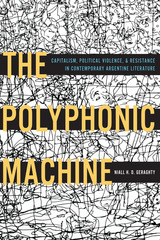2 books by Geraghty, Niall

Creative Spaces
Urban Culture and Marginality in Latin America
Edited by Niall Geraghty and Adriana Laura Massidda
University of London Press, 2019
Creative Spaces: Urban Culture and Marginality is an interdisciplinary exploration of the different ways in which marginal urban spaces have become privileged locations for creativity in Latin America. The essays within the collection reassess dominant theoretical notions of ‘marginality’ in the region and argue that, in contemporary society, it invariably allows for (if not leads to) the production of the new. While Latin American cities have, since their foundation, always included marginal spaces (due, for example, to the segregation of indigenous groups), the massive expansion of informal housing constructed on occupied land in the second half of the twentieth century have brought them into the collective imaginary like never before. Originally viewed as spaces of deprivation, violence, and dangerous alterity, the urban margins were later romanticized as spaces of opportunity and popular empowerment. Instead, this volume analyses the production of new art forms, political organizations and subjectivities emerging from the urban margins in Latin America, neither condemning nor idealizing the effects they produce. To account for the complex nature of contemporary urban marginality, the volume draws on research from a wide spectrum of disciplines, ranging from cultural and urban studies to architecture and sociology. Thus the collection analyzes how these different conceptions of marginal spaces work together and contribute to the imagined and material reality of the wider city.
[more]

The Polyphonic Machine
Capitalism, Political Violence, and Resistance in Contemporary Argentine Literature
Niall H.D. Geraghty
University of Pittsburgh Press, 2018
Focusing on the work of the Argentine authors César Aira, Marcelo Cohen, and Ricardo Piglia, The Polyphonic Machine conducts a close analysis of the interrelations between capitalism and political violence in late twentieth-century Argentina. Taking a long historical view, the book considers the most recent Argentine dictatorship of 1976–1983 together with its antecedents and its after-effects, exploring the transformations in power relations and conceptions of resistance which accompanied the political developments experienced throughout this period. By tracing allusive fragments of Argentine political history and drawing on a range of literary and theoretical sources Geraghty proposes that Aira, Cohen and Piglia propound a common analysis of Argentine politics during the twentieth century and construct a synergetic philosophical critique of capitalism and political violence. The book thus constitutes a radical reappraisal of three of the most important authors in contemporary Argentine literature and contributes to the philosophical and historical understanding of the most recent Argentine military government and their systematic plan of state terrorism.
[more]
READERS
Browse our collection.
PUBLISHERS
See BiblioVault's publisher services.
STUDENT SERVICES
Files for college accessibility offices.
UChicago Accessibility Resources
home | accessibility | search | about | contact us
BiblioVault ® 2001 - 2024
The University of Chicago Press









